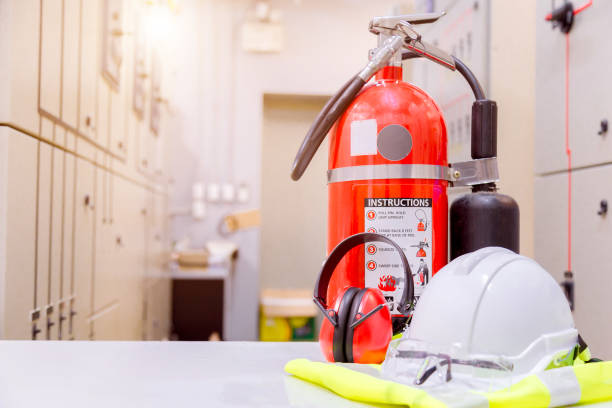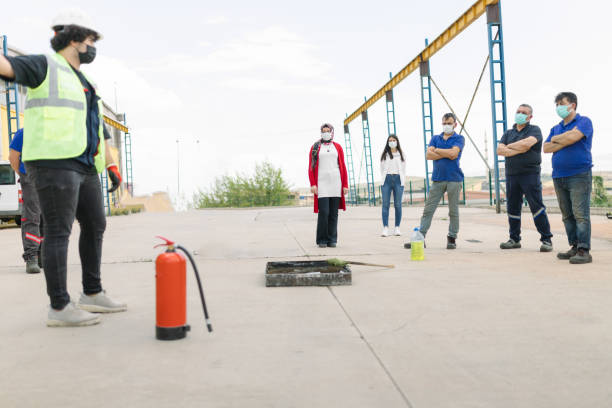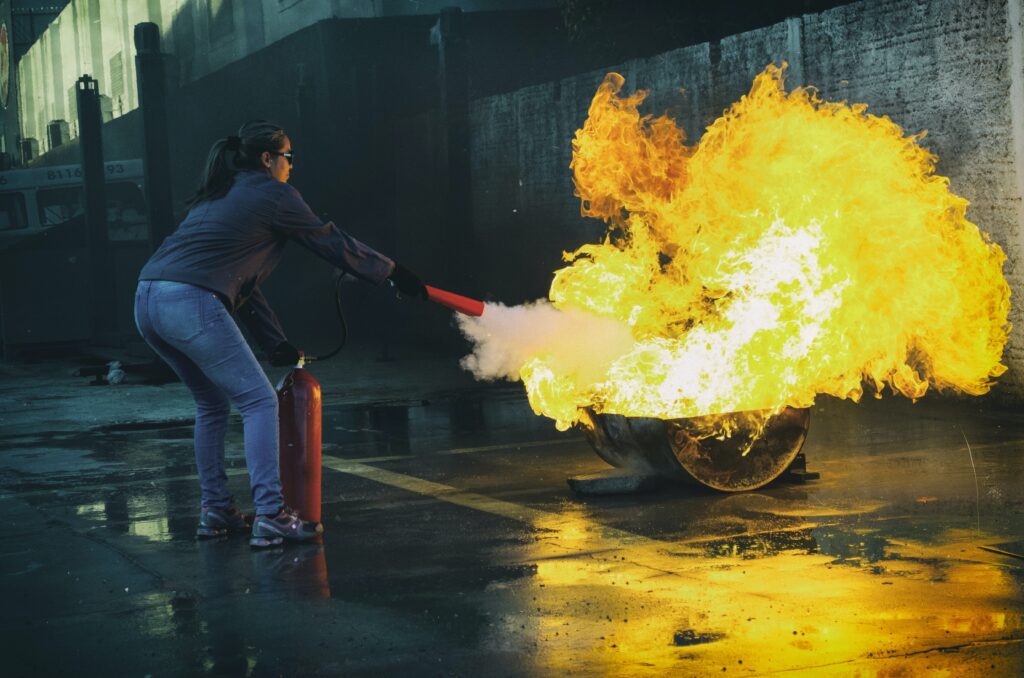No one knows when a fire can break out. It can cause immense destruction and disruption in just a matter of minutes. So businesses need to ensure that their premises are secure and safe from the effects of a fire. Fire safety training and regulations are essential to keeping your business safe.
Keeping businesses up to code regarding fire safety regulations in the UK is challenging. With rules constantly changing, business owners must stay ahead of the curve to remain compliant and protect their staff.
Fire safety regulations significantly minimise the risk of loss of life or property. With simple preventive measures, employers can ensure their premises meet all governmental fire safety requirements and help safeguard against any potential catastrophe.
Let’s look at some of the critical fire safety regulations businesses in the UK need to be aware of.
Who’s Responsible For Fire Safety In The UK?

As a business owner, you are ultimately responsible for providing a safe working environment for your employees. This includes having the proper fire safety protocols to minimise the risk of a fire breaking out and causing harm to anyone.
Under UK law, employers must understand their legal obligations regarding fire safety and ensure that their premises meet all necessary standards and regulations. Many employers hire a qualified fire safety consultant or fire-risk assessor to ensure complete compliance with all relevant regulations.
The following individuals have the potential and are likely to be assigned responsibility: [1]
- The employer
- Senior managers
- Fire safety advisers
- Other staff members and contractors
The Fire Safety Law That Applies To Businesses
The Regulatory Reform (Fire Safety) Order 2005 sets out the fire safety legal requirements that employers must adhere to. This includes having an up-to-date fire risk assessment, providing adequate fire safety training, and maintaining all appropriate safety equipment, such as alarms and extinguishers.
Employers must also ensure that any identified hazards are eliminated or, if this is not possible, suitable precautions are taken to minimise the risks.
● Fire Risk Assessments
By law, any business with 5+ employees must have a fire risk assessment conducted by a qualified assessor. This should be done as soon as the premises open and regularly updated to ensure compliance with all current regulations. [2]
The risk assessment should look at all fire hazards, consider the risks and evaluate ways to minimise any potential danger. It should also consider who will likely be affected by a fire, what fire safety measures are in place, and the emergency plans and escape routes available.
● Installation Of Fire Safety Equipment

Businesses must have the correct fire safety equipment to ensure their premises are safe. This includes installing smoke alarms, fire doors, and extinguishers and ensuring that all electrical appliances are regularly maintained.
The RRO legislation is particular about the type of equipment and its location. A qualified fire risk assessor can help you identify potential hazards, advise on the best safety measures to implement and ensure that all equipment is installed according to regulations.
● Keeping A Fire Safety Log Book
The fire risk assessment should be recorded in a fire safety log book. This important document outlines all the risks identified and any actions taken and provides updates on any changes to the premises or equipment.
Fire Log books should be kept up-to-date and easily accessible for staff members to refer to in an emergency. The book must be accessible to authorised individuals such as fire safety advisors and local authority enforcement officers.
● Displaying Fire Safety Signs
It is essential to display fire safety signs around the workplace in precise, visible locations. These signs should indicate the nearest emergency exit and assembly points.
Additionally, employers must provide fire safety information to all employees and ensure that everyone knows what actions they should take in the event of a fire.
Fire Safety Training

Well-trained staff can differentiate between a minor incident and a major disaster. Employers must provide Fire Safety Training For Employees, ensuring everyone knows what to do in an emergency.
Fire safety training should be regularly updated and refreshed with new information as it becomes available. Businesses should invest in fire safety courses for their employees to ensure that everyone knows the correct procedures and can act accordingly.
To void your worries, TrueMedic Ltd can help you with Fire safety training. We provide fire safety training courses designed to help you create and maintain a safe working environment.
Our course covers the fundamentals of fire safety, including identifying hazards, installing appropriate equipment, and ensuring everyone in the workplace understands their roles and responsibilities.
What If You Are Not Following the Regulations?
If you fail to follow the fire safety regulations, then you could be subject to enforcement action by your local authority. The action may include fines, warnings, or improvement notices.
These can have serious business consequences, so all regulations must be followed carefully. Some of the most destructive effects include: [3]
● Injuries And Fatalities
The most significant consequence of failing to comply with fire safety regulations is the potential for injuries and fatalities. Fire hazards can be easily overlooked, causing severe harm to workers or customers if left unchecked. The worst-case scenario is the loss of life, which could be avoided with proper regulation.
● Damages To Property
Apart from the potential for injury or death, failing to comply with fire safety regulations can also result in expensive damages to property. As fires spread quickly and cause extensive damage, businesses must take steps to protect their assets and employees.
● Penalty Charges And Legal Action
Businesses that fail to comply with fire safety regulations can face hefty fees and even legal action. Ignoring regulations is a serious offense, as it risks lives in the workplace.
It’s essential that businesses take their responsibilities seriously and invest in adequate fire safety measures, or else they could end up paying the price financially.
● Bad Reputation
Another consequence of not following fire safety regulations is a bad reputation. It can harm your reputation if customers or the public realise that you must meet requirements. In extreme cases, businesses may even lose their license if they fail to comply with regulations.
FAQs
1. Do I need a fire safety certificate UK?
Yes, if you run a business in the UK, a fire risk assessment is required by law. An appropriately qualified professional must carry out this assessment to determine the risks and measures needed to reduce or eliminate them. The assessment must be kept up to date and reviewed regularly. A fire safety certificate will be issued as evidence of this assessment and must be held on-site.
2. Is a fire safety policy a legal requirement?
Yes, a fire safety policy is a requirement under the Regulatory Reform (Fire Safety) Order 2005. The policy aims to ensure that everyone in your workplace is aware of their responsibilities for fire safety and that all necessary precautions are taken.
3. Where are fire doors required in commercial buildings UK?
Fire doors are an essential part of fire safety in commercial buildings in the UK. Fire doors should be located wherever a compartment wall or floor is required to protect against the spread of smoke and fire. This includes corridors, stairways, lifts, lobbies, storage rooms, and any other area where there may be a risk of fire spreading.
References:
[1]https://www.gov.uk/workplace-fire-safety-your-responsibilities
[2]https://surreyfire.co.uk/fire-safety-legislation/
[3]https://fire-extinguisher-maintenance.co.uk/blog/fire-safety-laws-business/





